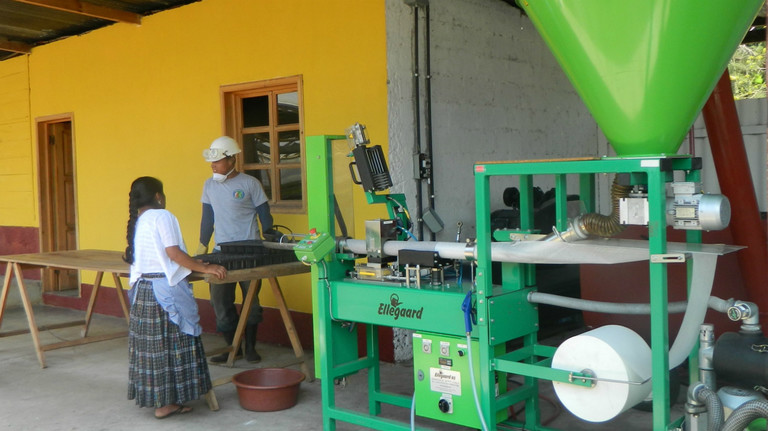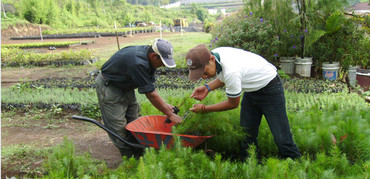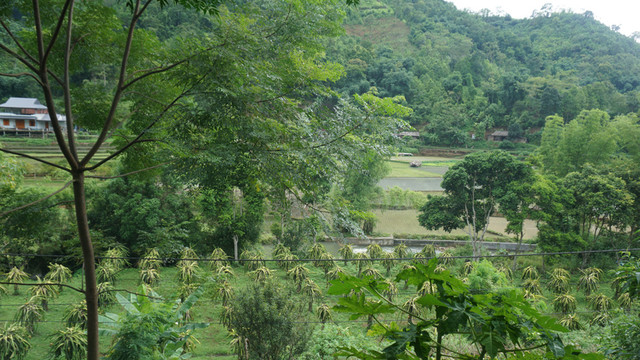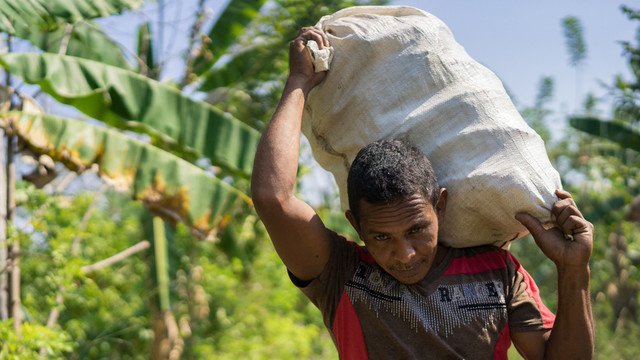IIED marks international forests day with major new research report and toolkit
IIED is marking the International Day of Forests (21 March) by issuing two new publications with its Forest and Farm Facility partners that highlight a powerful new approach to strengthening forests and forest producers.

Cooperative members at the Federation of Cooperatives of the Verapaces nursery in Cobán, Guatemala operate a compost packing machine. FEDECOVERA oversees the production of cardamom, allspice, coffee, tea, cocoa, essential oils, grains and vegetables (Photo: Juan José Ochaeta/FEDECOVERA)
Forest business incubation is a process that accelerates the development of successful, sustainable forest businesses that serve both people and forests. The process is critical for implementing the Sustainable Development Goals (SDGs) and the Paris Agreement, strengthening forest economies, increasing rural incomes and improving climate resilience.
Peter de Marsh, chair of the International Family Forestry Alliance, explains the significance of this work: "The FFF Partnership is building hope for our families, our communities, and the planet.
"The encouragement from FFF is not just about support for our efforts to replace bad, unjust, and dysfunctional government policies and market distortions with better ones. The new book and toolkit on business incubation help take our work a step further, from creating the potential for new directions, to actually moving towards them."
IIED has been studying how different organisations around the world are going about incubating sustainable forest businesses.
This research has culminated in a major new report, titled 'Forest business incubation: towards sustainable forest and farm producer organisation (FFPO) businesses that ensure climate resilient landscapes'. The 300-page report, free to download from the IIED website, analyses why forest business incubation is both challenging and different from business incubation in urban settings.
The publication includes detailed case studies of efforts to deliver business incubation services in forest landscapes in Asia, Africa and Latin America.
IIED is also launching a practical toolkit for developing business incubation capabilities. The toolkit, 'ForBInc: a forest business incubation toolkit by and for Forest and Farm Producer Organisations', shows how to develop business incubation capabilities within an existing institutional structure, such as an FFPO or NGO or government extension agency. It offers a framework specific to forest and farm landscapes, with practical tips and guidance throughout.
Both publications have been published with the Forest and Farm Facility (FFF), an international partnership that provides support to forest and farm producer organisations. FFF partners include the Food and Agriculture Organisation (FAO) of the United Nations, the International Union for Conservation of Nature (IUCN) and AgriCord.
The Forest and Farm Facility partnership: building hope
The new publications mark the transition from the first phase of the FFF partnership to a new second phase. Over the last five years, IIED and its partners have been working to strengthen FFPO business and policy engagement capacities, and have achieved remarkable, cost-efficient impacts.
FFF has reached 947 FFPOs in 10 partner countries: Plurinational State of Bolivia, the Gambia, Guatemala, Kenya, Liberia, Myanmar, Nepal, Nicaragua, Vietnam and Zambia. In addition, the partnership has delivered regional and global programmes engaging with some 30 organisations with a combined membership of more than 40 million people.
FFF has also identified gaps in FPPO knowledge and responded by generating guidance such as the practical toolkit 'Securing forest business: A risk management toolkit for locally controlled forest businesses', alongside 50 other knowledge products.
The findings are echoed in early results from an evaluation of the Climate Investment Funds' Forest Investment Program portfolio, which has identified a 'missing middle' in investments and financing for forest-related businesses. IIED has partnered with LTS International to generate lessons and recommendations from this Evaluation and Learning Partnership.
FFF: looking ahead to Phase II
The success of FFF has led to more than 40 countries applying to join Phase II of the FFF. From 2018-22, work will continue to strengthen FFPOs that represent smallholders, rural women's groups, local communities and indigenous peoples.
But in this new phase, FFF will help forge concrete links between FFPOs with climate change and forest landscape restoration programmes, and help FFPOs deliver the social and cultural services that are critical to implementing the SDGs.
The SDGs recognise the need for transformative action on forest loss and poverty: agriculture and forestry have links to all 17 of the goals. To achieve the SDGs, it will be essential to mobilise the collective agency of the world's 1.5 billion forest and farm smallholders and indigenous peoples. FFF's work is highlighting the potential of producer organisations to be a vital operating system for the SDGs.
Contact
Duncan Macqueen (duncan.macqueen@iied.org), principal researcher in IIED's Natural Resources research group




